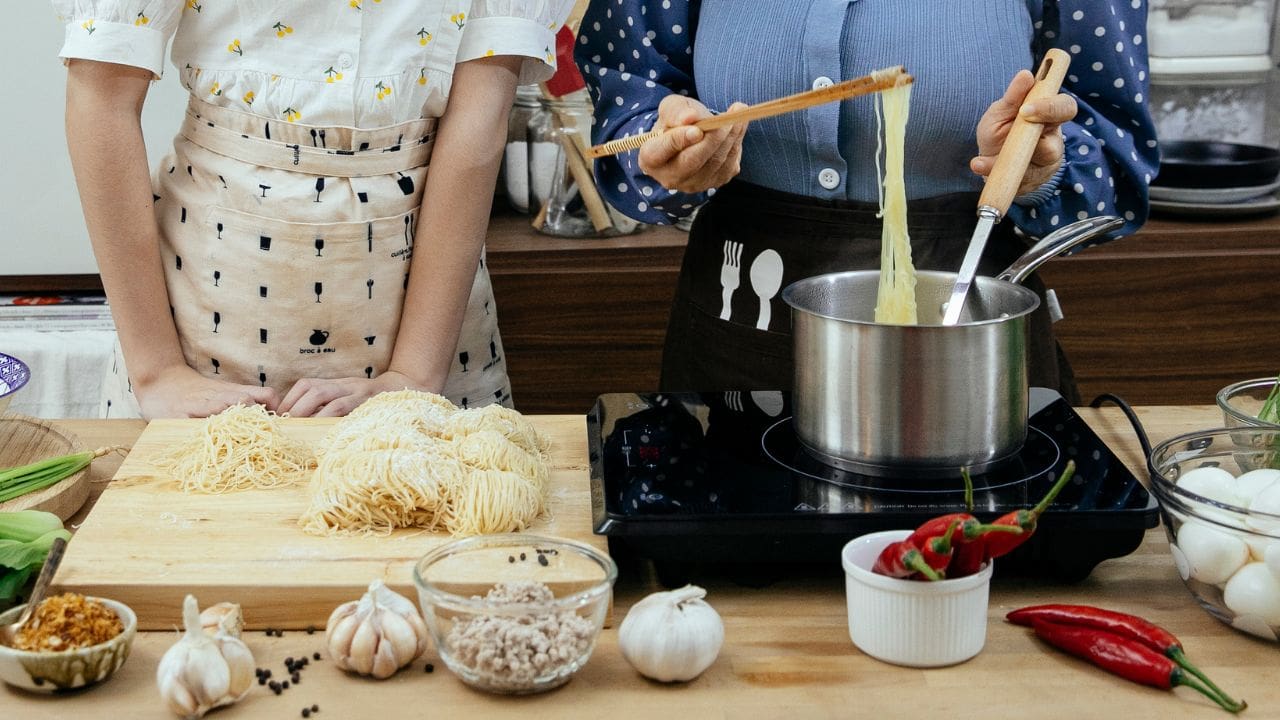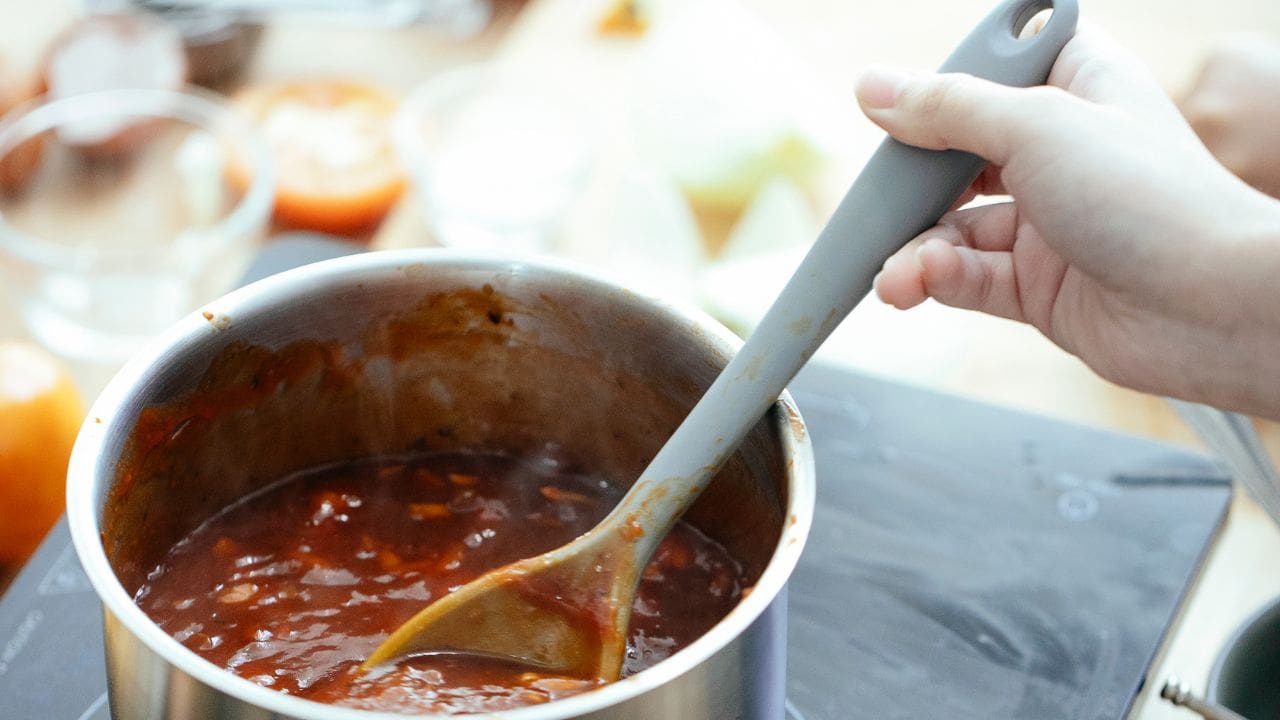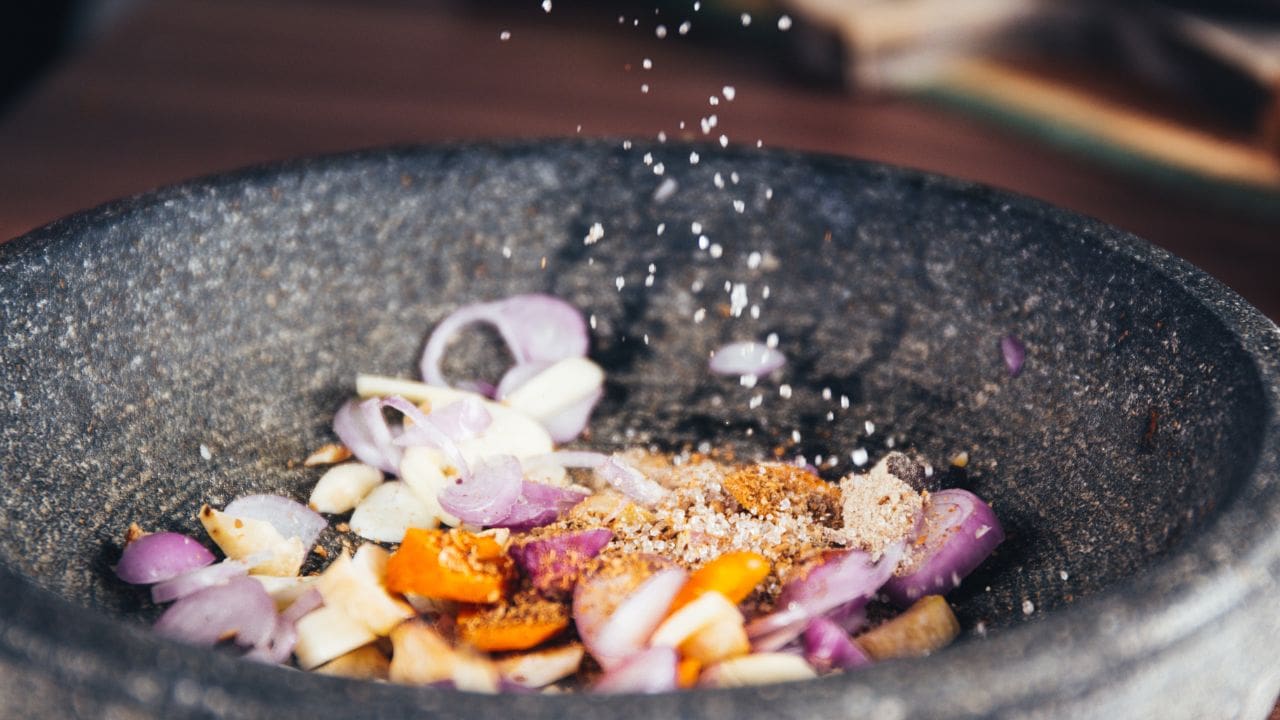Health
Essential Vegan Meal Prep: Top 10 Ingredients for Delicious Plant-Based Cuisine


In the realm of plant-based cuisine, the art of meal preparation is not only a matter of convenience but also an essential aspect of ensuring a balanced and flavorful diet. The foundation of successful vegan meal prep lies in the selection of key ingredients that not only provide sustenance but also elevate the flavors and textures of each dish.
As we explore the top 10 essential ingredients for delicious plant-based cuisine, we uncover a world of versatile and nutrient-rich elements that form the cornerstone of countless delectable vegan recipes. Each ingredient holds the potential to transform simple dishes into culinary delights, and understanding their unique properties is the key to elevating your plant-based meal prep to new heights.
Key Takeaways
- Nutritional yeast is a versatile ingredient that provides essential amino acids, B vitamins, and savory flavor in vegan meals.
- Avocado is a nutrient-dense ingredient rich in monounsaturated fats, fiber, vitamins, and antioxidants, making it a valuable addition to vegan meal prep.
- Sweet potatoes are a versatile and nutrient-dense ingredient that adds natural sweetness to meals while providing vitamins, fiber, and antioxidants.
- Brown rice is a whole grain that is rich in fiber, minerals, and antioxidants, making it a versatile and digestion-friendly base for vegan meals.
Nutritional Yeast
Nutritional yeast is a versatile and nutritious ingredient commonly used in plant-based cuisine for its rich umami flavor and high nutritional content, making it a valuable addition to vegan meal prep.
This deactivated yeast, often a strain of Saccharomyces cerevisiae, is an excellent source of protein, containing all nine essential amino acids required for optimal health. Additionally, it is fortified with essential B vitamins, including B12, a nutrient that can be challenging to obtain in a vegan diet.
Nutritional yeast also provides a savory, cheese-like flavor, making it a popular choice for enhancing the taste of various dishes, such as pastas, soups, and salads.


Moreover, nutritional yeast is low in fat and sodium, making it a heart-healthy choice for individuals following a plant-based diet. Its versatility allows for diverse culinary applications, such as creating dairy-free cheese sauces or seasoning popcorn and roasted vegetables.
When considering its nutrient density and culinary flexibility, nutritional yeast stands as an indispensable ingredient for those seeking to elevate the flavor and nutritional profile of their vegan meal preparations.
Avocado
Avocado, a nutrient-dense fruit known for its creamy texture and rich flavor, is a versatile ingredient that holds a prominent place in plant-based cuisine due to its numerous health benefits and culinary adaptability. This green powerhouse is packed with heart-healthy monounsaturated fats, which can help lower bad cholesterol levels and reduce the risk of heart disease. Additionally, avocados are an excellent source of fiber, potassium, vitamin E, B-vitamins, and antioxidants, making them a valuable addition to a balanced vegan diet.
In culinary terms, avocados can be used in a myriad of ways, from savory dishes to sweet treats. Their smooth and buttery consistency makes them perfect for creating creamy sauces, dressings, and spreads, while their mild flavor complements a wide variety of ingredients. Whether mashed onto toast, blended into a smoothie, or sliced into a salad, avocados add a satisfying richness and depth to plant-based meals.
When meal prepping, avocados can be a convenient addition, as they can be easily incorporated into various recipes or simply enjoyed on their own. To ensure optimal freshness, it’s advisable to store cut avocados with their pits, or to drizzle them with citrus juice to prevent browning. By harnessing the nutritional and culinary potential of avocados, individuals can elevate the taste and health profile of their vegan meal preps.


Sweet Potato
Sweet potatoes are a versatile and nutrient-dense root vegetable that plays a significant role in plant-based cuisine due to their rich flavor and numerous health benefits. These tubers are a great source of vitamins, particularly vitamin A, which is essential for healthy vision, immune function, and skin health. They also provide a good amount of fiber, which supports digestion and helps maintain a feeling of fullness. Additionally, sweet potatoes are packed with antioxidants, such as beta-carotene, which may reduce the risk of chronic diseases.
In vegan meal prep, sweet potatoes can be utilized in a variety of ways. They can be roasted, mashed, or spiralized to make a delicious base for bowls, salads, and wraps. Their natural sweetness makes them a versatile ingredient for both savory and sweet dishes. Sweet potato fries, soups, and even desserts can all benefit from the addition of this nutritious root vegetable.
When meal prepping, consider roasting a batch of sweet potatoes to have on hand throughout the week, ready to be added to meals or enjoyed as a healthy snack.
Brown Rice
A staple in plant-based meal preparation, brown rice is a whole grain known for its nutty flavor and nutritional value. As a rich source of fiber, essential minerals, and antioxidants, brown rice offers numerous health benefits. The high fiber content aids in digestion and can contribute to a lower risk of developing certain chronic conditions such as heart disease and type 2 diabetes. Additionally, the complex carbohydrates in brown rice provide a steady release of energy, making it an excellent choice for sustaining energy levels throughout the day.
When it comes to vegan meal prep, brown rice is a versatile ingredient that can be used in a myriad of dishes, ranging from stir-fries to grain bowls and stuffed vegetables. Its neutral taste allows it to pair well with various flavors and seasonings, making it an ideal base for a wide range of cuisines. Brown rice is also readily available and cost-effective, making it a practical choice for those seeking budget-friendly and nutritious meal options.


Whether served as a side dish or incorporated into a main course, brown rice is a valuable addition to any plant-based meal prep routine.
Kale
Kale is a nutritional powerhouse, packed with vitamins A, K, and C, as well as minerals like calcium and iron.
Its culinary versatility makes it a fantastic addition to a variety of dishes, from salads and smoothies to soups and stir-fries.
When it comes to cooking and storage, kale can be enjoyed raw, sautéed, or baked, and proper storage in the refrigerator can help maintain its freshness for up to a week.
Nutritional Benefits
One of the most nutrient-dense leafy greens available, kale is renowned for its exceptional health benefits and versatility in plant-based cuisine. It is a powerhouse of essential nutrients and offers numerous advantages for those following a vegan lifestyle.


Here are some of the key nutritional benefits of kale:
- High in Vitamin K: Kale is an excellent source of vitamin K, crucial for bone health and blood clotting.
- Rich in Antioxidants: It is packed with antioxidants like beta-carotene and flavonoids, which help protect against various diseases.
- Abundant in Vitamin C: Kale provides a significant amount of vitamin C, essential for a strong immune system and healthy skin.
- Good Source of Iron: For those seeking plant-based sources of iron, kale is a valuable addition to the diet, supporting energy levels and metabolism.
Culinary Versatility
Renowned for its exceptional health benefits and versatility in plant-based cuisine, kale’s culinary versatility makes it a valuable ingredient for a wide range of vegan meal preparations.
Whether used raw in salads, blended into smoothies, or sautéed as a side dish, kale offers diverse culinary applications.
Its sturdy leaves also make it suitable for baking into crispy kale chips or incorporating into soups and stews, adding a nutrient-rich boost to various dishes.
Additionally, kale can be marinated and massaged to create tender and flavorful salads or utilized as a vibrant and nutritious wrap for fillings.


Its adaptability in different cooking methods, such as steaming, stir-frying, or grilling, further enhances its appeal as a versatile ingredient that allows for freedom and creativity in plant-based meal preparation.
Cooking and Storage
A key aspect to consider when preparing and storing kale for plant-based meals is to ensure proper cooking techniques and storage methods to maintain its nutritional value and flavor.
- Cooking Techniques:
- Gently massage kale with a bit of olive oil to break down its toughness for salads and smoothies.
- Saute kale with garlic and a splash of lemon juice to enhance its flavor.
Storage Methods:
- Store unwashed kale in a perforated plastic bag in the refrigerator to maintain freshness.
- Consider blanching and freezing kale for longer storage, ensuring it retains its nutrients.
Broccoli
Broccoli is a versatile and nutritious vegetable that offers a wide array of health benefits. Packed with vitamins, minerals, and antioxidants, broccoli is known for its potential to support overall health and wellbeing.
From simple steaming and roasting to more complex recipes, there are numerous cooking methods to explore when incorporating broccoli into your plant-based meal prep routine.


Broccoli Health Benefits
What are the significant health benefits associated with including broccoli in a plant-based diet?
Broccoli is a nutritional powerhouse, offering a wide range of health benefits that make it an essential addition to any plant-based meal plan.
- Rich in Nutrients: Broccoli is packed with essential vitamins and minerals, including vitamin C, vitamin K, and folate, which are crucial for overall health.
- Antioxidant Properties: It contains potent antioxidants such as sulforaphane and kaempferol, which help protect the body from oxidative stress and reduce the risk of chronic diseases.
- Supports Digestive Health: Broccoli is a good source of fiber, promoting healthy digestion and supporting gut health.
- Potential Cancer-Fighting Properties: Studies suggest that the compounds in broccoli may have protective effects against certain types of cancer, making it a valuable addition to a cancer-preventive diet.
Broccoli Cooking Methods
When preparing broccoli as part of a plant-based meal, there are several cooking methods that can help retain its nutritional benefits and enhance its flavor.
Steaming broccoli is one of the best ways to preserve its nutrients, as it minimizes the loss of water-soluble vitamins. This method also helps to maintain the vegetable’s vibrant green color and crisp texture.
Another popular method is roasting, which caramelizes the natural sugars in the broccoli, resulting in a deliciously nutty flavor and slightly crispy texture.


For those looking for a quick and easy option, stir-frying broccoli can be a great choice, as it preserves the vegetable’s crunchiness while adding depth of flavor.
Regardless of the cooking method chosen, it’s important to avoid overcooking to retain the broccoli’s nutritional value.
Broccoli Meal Ideas
To incorporate broccoli into your plant-based meals, consider exploring a variety of flavorful and nutritious meal ideas. Broccoli is a versatile vegetable that can be prepared in numerous delicious ways, adding both texture and essential nutrients to your meals.
Here are some inspiring broccoli meal ideas to add variety to your plant-based cuisine:
- Roasted Broccoli and Chickpea Salad: Toss roasted broccoli and chickpeas with a zesty vinaigrette for a satisfying salad option.
- Broccoli and Tofu Stir-Fry: Create a quick and flavorful stir-fry by combining broccoli, tofu, and a savory sauce served over brown rice.
- Broccoli and Red Lentil Soup: Simmer broccoli and red lentils with aromatic spices for a comforting and nutritious soup option.
- Broccoli and Quinoa Stuffed Peppers: Mix broccoli and quinoa as a delicious filling for colorful bell peppers, then bake until tender.
These meal ideas offer delicious ways to incorporate broccoli into your plant-based meal prep, providing both flavor and essential nutrients.


Almond Milk
Derived from ground almonds, almond milk is a popular dairy-free alternative that is commonly used in vegan and plant-based cooking and baking. With its creamy texture and nutty flavor, almond milk has become a staple in the diets of those seeking dairy alternatives.
Rich in vitamin E, almond milk also provides a good source of calcium, making it a nutritious choice for those following a plant-based diet. Almond milk is a versatile ingredient, suitable for use in a wide variety of recipes, including smoothies, oatmeal, baked goods, and savory dishes.
When purchasing almond milk, it’s important to check the ingredients to ensure it does not contain added sugars or unnecessary additives. Many brands also offer fortified almond milk, providing additional nutrients such as vitamin D and B12. For those with nut allergies, there are alternative plant-based milk options such as soy, oat, or coconut milk.
Almond milk’s popularity continues to grow as more individuals seek out dairy-free choices, making it an essential ingredient for delicious and nutritious vegan meal preparation.
Coconut Oil
Coconut oil is a versatile and popular ingredient in plant-based cuisine. It is especially appreciated for its high smoke point, which allows for cooking at high temperatures. Additionally, coconut oil is rich in medium-chain triglycerides. These compounds may have potential health benefits, such as improving weight management and increasing good HDL cholesterol levels. When used in moderation, coconut oil can be a valuable addition to a vegan meal prep repertoire.
Cooking With Coconut Oil
When it comes to plant-based cooking, incorporating coconut oil can add a unique flavor profile and a healthy source of fat to your dishes. Coconut oil is a versatile ingredient that can be used for sautéing, baking, and even in raw dessert recipes.
Here are a few reasons why coconut oil is a great addition to your vegan meal prep:
- It has a high smoke point, making it suitable for high-heat cooking.
- The saturated fats in coconut oil can provide a feeling of fullness and satisfaction.
- Coconut oil contains lauric acid, which has potential antimicrobial and antiviral properties.
- Its distinct flavor can enhance the taste of both sweet and savory dishes.
Incorporating coconut oil into your plant-based meal prep can elevate the flavors and nutritional value of your dishes.
Health Benefits
After discussing the culinary versatility of coconut oil in plant-based cuisine, it is essential to explore its associated health benefits, which can contribute to the overall nutritional value of vegan meal preparations.
Coconut oil contains medium-chain triglycerides (MCTs), which have been linked to various health benefits, including improved brain function, weight management, and heart health. MCTs are easily metabolized by the body and can be used as a quick source of energy.


Additionally, coconut oil is rich in lauric acid, known for its antiviral, antibacterial, and antifungal properties. These components make coconut oil a valuable addition to a vegan diet, offering a healthy source of fat and potential protective effects against certain diseases.
When used in moderation, coconut oil can be an excellent choice for enhancing the nutritional profile of plant-based meals.
Flaxseed
A valuable addition to a plant-based diet, flaxseed offers a rich source of omega-3 fatty acids and fiber, enhancing the nutritional profile of vegan meals. Here are some reasons why flaxseed is an essential ingredient for delicious and nutritious plant-based cuisine:
- Omega-3 Fatty Acids: Flaxseed is one of the best sources of alpha-linolenic acid (ALA), a type of omega-3 fatty acid that is crucial for heart health and brain function.
- Fiber: High in soluble and insoluble fiber, flaxseed promotes digestive health and helps maintain stable blood sugar levels, making it an ideal component of a balanced vegan diet.
- Versatility: Ground flaxseed can be easily incorporated into various recipes, such as smoothies, oatmeal, and baked goods, providing a convenient way to boost the nutritional value of meals.
- Plant-Based Protein: Along with its omega-3 and fiber content, flaxseed also offers a good amount of plant-based protein, making it a valuable addition for those seeking to meet their protein needs on a vegan diet.
Incorporating flaxseed into your meal prep routine can be a simple yet effective way to elevate the nutritional content of your plant-based meals.
Banana
An excellent addition to vegan meal prep, bananas provide a versatile and nutritious ingredient for a variety of plant-based recipes. Bananas are rich in essential nutrients such as potassium, vitamin C, and vitamin B6, making them a valuable component of a balanced vegan diet. Their natural sweetness and creamy texture make them a perfect ingredient for smoothies, oatmeal, baked goods, and desserts, offering a healthier alternative to refined sugars and fats.


In addition to their nutritional benefits, bananas are incredibly convenient for meal prepping. They require minimal preparation, can be easily incorporated into various dishes, and are suitable for freezing, which helps to minimize food waste and ensures a readily available supply for future meal prep sessions.
Furthermore, bananas are an excellent source of natural energy, making them an ideal pre- or post-workout snack for individuals following a plant-based lifestyle. Their versatility and convenience make them a fundamental ingredient for delicious and nutritious vegan meal prep, offering freedom and flexibility in creating a wide range of plant-based dishes.
Frequently Asked Questions
Can You Provide Tips for Meal Prepping With These Ingredients to Ensure Freshness and Quality Throughout the Week?
To ensure freshness and quality throughout the week when meal prepping with these ingredients, store them properly in airtight containers, use vacuum-sealing for longer preservation, and consider freezing some items to maintain peak flavor and nutritional value.
Are There Any Specific Cooking Techniques or Methods That Work Best for These Ingredients When Preparing Them for Meal Prep?
When preparing ingredients for vegan meal prep, using techniques like batch cooking, blanching, and marinating can help maintain freshness and flavor. These methods can optimize the quality and texture of plant-based ingredients throughout the week.
How Can I Incorporate These Ingredients Into a Variety of Different Meal Types, Such as Breakfast, Lunch, and Dinner?
To incorporate these ingredients into various meals, use tofu for breakfast scrambles or smoothies, quinoa for lunch salads, and lentils for dinner stews. Experiment with different cooking methods like roasting, sautéing, or marinating to add variety and flavor.


Are There Any Potential Allergens or Sensitivities to Consider When Using These Ingredients in Meal Prep?
When incorporating these ingredients into meal prep, it’s crucial to consider potential allergens or sensitivities. Common allergens like nuts, soy, and gluten can be present, so thorough ingredient scrutiny is essential for creating allergen-free, plant-based meals.
Can You Recommend Any Creative and Unique Recipes That Feature These Ingredients for a Diverse and Enjoyable Plant-Based Meal Prep Experience?
Certainly! Incorporate the top 10 vegan ingredients into diverse recipes for an enjoyable meal prep experience. Explore savory tofu and vegetable stir-fries, hearty lentil and quinoa salads, and flavorful chickpea curry bowls. These recipes offer a practical and creative approach to plant-based cuisine.


Hi, I’m Kyle Rivera, a news journalist and blog editor with the Daily Evening News. A TCU alum with a flair for storytelling, I spend my days uncovering impactful stories and my evenings exploring the realms of yoga, cycling, and whimsically bad poetry.
Travel is my escape; I’ve trekked from Tokyo’s neon lights to Iceland’s tranquil vistas. But no journey is complete without Mogli, my Golden Retriever, who’s redefining his breed standards in the most charming ways.
I love connecting with fellow travelers, yogis, cyclists, and anyone who enjoys a laugh at my poetic attempts. If you’re into stories that inspire, travel escapades, or just want to see what Mogli and I are up to, I’d love to hear from you on Instagram or Facebook. Let’s share tales and tips from around the globe!

